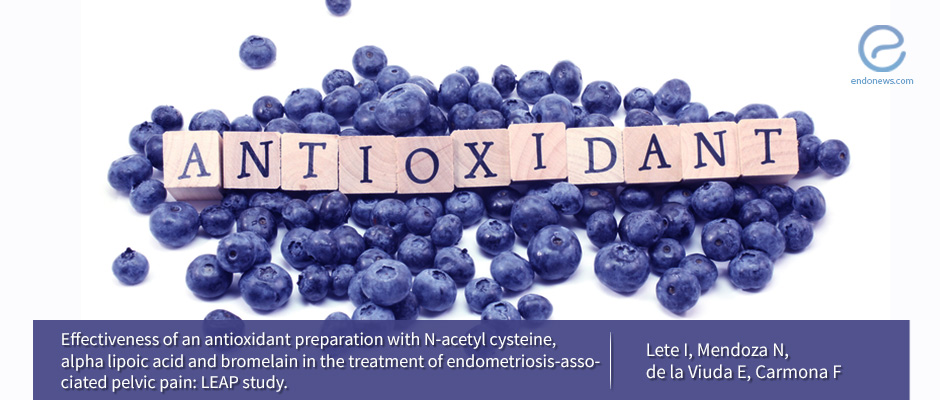N-acetyl cysteine, alpha lipoic acid and bromelain improved endometriosis-associated pelvic pain
Jul 30, 2018
Antioxidants for the treatment of endometriosis pain
Key Points
Highlight:
- N-acetyl cysteine, alpha lipoic acid, and bromelain may be useful to improve endometriosis-associated pelvic pain.
Importance:
- There is a limited drug option for the pain of the patients diagnosed with endometriosis, especially if they wish to become pregnant. Hence, a new therapy is highly needed.
What's done here:
- This is a multicenter, open-label, non-comparative clinical trial in women with endometriosis-associated pelvic pain.
- A total of 398 patients with a mean age of 34.6 ± 7.2 years were treated with a combination of N-acetyl cysteine, alpha lipoic acid, and bromelain for 6 months.
Data:
- Before treatment, 92.7% of the patients had pain intensity > 4 on the visual analogue scale (VAS) as compared to 87.2% (p = 0.074) and 82.7% (p < 0.05) at 3 months and 6 months after treatment, respectively.
Limitations:
- This study did not differentiate the type of endometriosis being treated, i.e., deep endometriosis or endometriosis of the rectovaginal wall or adenomyosis.
- This is an observational study with no comparison to any other type of treatment.
- The analysis is based on a subjective scale and even the placebo effect is not compared.
Lay Summary
Oxidative stress has been implicated in many processes that lead to the development and progression of endometriosis. Typically, women with endometriosis have to endure pelvic pain which negatively impacts their quality of life. Pelvic pain can be chronic and related to dysmenorrhea and dyspareunia. Endometriosis treatment includes gonadotropin-releasing hormone analogs and hormonal contraceptives. These treatments are not suitable for women who wish to become pregnant. Other treatments options that can preserve fertility include analgesics and/or anti-inflammatory agents.
One of the ways to counteract oxidative stress is using the antioxidant system to eliminate free radicals. N-acetyl cysteine is a precursor of glutathione, which is the main antioxidant to remove reactive oxygen species, hydrogen peroxide and the hydroxyl radical in cells. Thus, it may be beneficial for endometriosis-associated pelvic pain through counteracting oxidative stress.
This article by Lete et al. from Universidad Autónoma de Barcelona, Barcelona, Spain was published in the European Journal of Obstetrics & Gynecology and Reproductive Biology. The aim is to analyze the efficacy of N-acetyl cysteine, alpha lipoic acid and bromelain preparation in controlling endometriosis-associated pelvic pain.
The clinical trial was multi-centered, open-label and non-comparative. The clinical criteria considered for endometriosis-associated pelvic pain include dysmenorrhea, dyspareunia, dyschezia, or chronic pelvic pain. A total of 398 patients with a mean age of 34.6±7.2 years participated, in which 92.7% reported moderate or intense endometriosis-associated pelvic pain. Endometriosis in the participants was diagnosed clinically and by imaging or surgery. Prior to this study, 74% of patients reported the use of hormonal contraceptives. For the study, patients were given a combination N-acetyl cysteine 600 mg, alpha lipoic acid 200 mg, bromelain 25 mg and zinc 10 mg for 6 months at a dose of 2 tablets per day.
The results showed a significant decrease in the percentage of patients with endometriosis-associated pelvic pain, from 92.7% before treatment to 82.7% after the 6 months treatment. In addition, there was also a significant reduction in VAS score pain scale, with severe pain reported in 40.2% at baseline to 3.6% at 6 months. Therefore, the authors concluded that N-acetyl cysteine, alpha lipoic acid and bromelain combination showed promise to improve endometriosis-associated pelvic pain.
Research Source: https://www.ncbi.nlm.nih.gov/pubmed/30007250
treatment oxidative stress N-acetyl cysteine alpha lipoic acid bromelain clinical trial open-label non-comparative pain dysmenotthea dysparunia ROS

